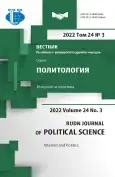Crypto-Anarchism: The Ideology of Blockchain Technologies
- Authors: Brekhov G.S.1
-
Affiliations:
- Peoples’ Friendship University of Russia (RUDN University)
- Issue: Vol 24, No 3 (2022): Internet and Politics
- Pages: 393-407
- Section: DIGITAL POLITICS
- URL: https://journal-vniispk.ru/2313-1438/article/view/322607
- DOI: https://doi.org/10.22363/2313-1438-2022-24-3-393-407
- ID: 322607
Cite item
Full Text
Abstract
One of the most modern currents of anarchism - crypto-anarchism - arose as a response to the global development of digital technologies and the Internet and operates exclusively within the framework of the “global web”. The paper attempts to study one of the most unusual branches of anarchist philosophy and its impact on the digital life and politics of several states. With the help of functional and comparative methods of political research, the author analyzes crypto-anarchism as part of the ideology of anarchism, the main goal of which is to find out how viable crypto-anarchism is as an independent movement. The article raises the question of whether the ideas of crypto-anarchism can be used to effectively address current socio-political problems. The theoretical basis of crypto-anarchism looks more and more relevant, as it affects the security of the individual on the Web and is aimed at fighting against widespread state control. Despite the fact that, as the study showed, cryptoanarchism as a movement does not have sufficient elaboration and influence on real politics, its deeper study can be useful for preparing political programs aimed at Internet users (which constitute around 62.5 % of the global population), as well as studying political models and their development paths using virtual simulations and virtual states (Liberland, Wirtland), which are characteristic of crypto-anarchism.
About the authors
Gleb S. Brekhov
Peoples’ Friendship University of Russia (RUDN University)
Author for correspondence.
Email: 1042200137@rudn.university
ORCID iD: 0000-0001-5723-4957
postgraduate of Political Science, Department of Comparative Politics
Moscow, Russian FederationReferences
- Call, L. (2002). Postmodern anarchism. Maryland: Lexington Books.
- Chaum, D. (1985). Security without identification: Transaction systems to make big brother obsolete. Communications of the acm. 28(10), 1030–1044.
- Chohan, U.W. (2017). Cryptoanarchism and cryptocurrencies. Available at SSRN 3079241.
- Chomsky, N. (2016). Notes on anarchism. Bristol: Active Distribution.
- Dylan-Ennis, P. (2021). Teaching cryptocurrencies as cryptocultures. Journal of Applied Learning and Teaching, 4(2).
- Gaman-Golutvina O.V., Smorgunov L.V., & L.N. Timofeeva. (Eds.). (2021). Russia and the political order in a changing world: Values, institutions, prospects. Proceedings of the IX AllRussian Congress of Political Scientists. Moscow, December 16–18, 2021. Moscow: Aspect Press. (In Russian)
- Hallsby, A. (2020). Psychoanalysis against WikiLeaks: Resisting the demand for transparency. Review of Communication, 20(1), 69–86.
- Jarvis, C. (2021). Cypherpunk ideology: Objectives, profiles, and influences (1992–1998). Internet Histories, 1–27.
- Karagiannopoulos, V. (2020). A short history of hacktivism: Its past and present and what can we learn from it. In Rethinking Cybercrime (pp. 63-86). Cham: Palgrave Macmillan.
- Karlstrøm, H. (2014). Do libertarians dream of electric coins? The material embeddedness of Bitcoin. Distinktion: Scandinavian Journal of Social Theory, 15(1), 23–36.
- Ludlow, P. (Ed.). (2001). Crypto anarchy, cyberstates, and pirate utopias. MIT Press.
- May, T. (2021). The political philosophy of poststructuralist anarchism. The Political Philosophy of Poststructuralist Anarchism. University Park: Penn State University Press.
- Nyangaga, J.O. (2022). The doctrine of occupation through “Terra Nullius” as a right of selfdetermination of peoples and the legal status of “Liberland” territory under international law. Beijing Law Review, 13(1), 119–132.
- Osipov, V.A. (2020). The virtual state as a social innovation. In V.G. Ivanov (Ed.), Social innovation management: experience, problems and prospects: Proceedings of the VIII All-Russian Scientific and Practical Conference (pp.50–56). Moscow: RUDN. (In Russian).
- Semenzin, S., Rozas, D., & Hassan, S. (2022). Blockchain-based application at a governmental level: Disruption or illusion? The case of Estonia. Policy and Society, 00(0), 1–16, puac014. http://dx.doi.org/10.1093/polsoc/puac014
Supplementary files









